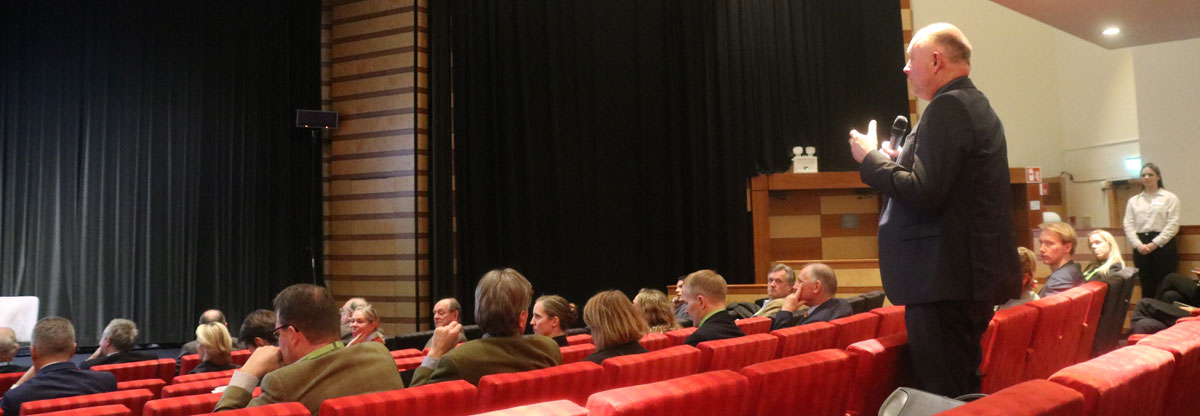2022 Regional Sweden – Session 2 summary – Integrating climate mitigation and biodiversity regeneration in food system transformation
2022 Regional meeting Sweden
Thursday, Dec 01, 2022
On Thursday, December 1, 2022 an expert panel representing landowners, industry and government research discussed ways to integrate climate mitigation and biodiversity regeneration in food system transformation at the Forum’s Regional Conference in Sweden. Ideas raised ranged from technical innovation, economic incentives and more effective communication on agriculture’s contribution to the transformation.
Carl-Henrik Ljung, Market Manager Sweden, Syngenta, began the discussion by explaining that transformation of the food system was an important element of the company’s work. This focuses largely on crop protection to reduce CO2 emissions and achieve maximum yield per hectare. Alexandre Amaral, Researcher and Advisor to Embrapa’s Board of Directors, followed giving examples of innovative techniques being developed in Brazil in partnership with the private sector. These include biological nitrogen and use of microbes to save phosphorus in the soil.
Jurgen Tack, Scientific Director, European Landowners’ Organisation, emphasised the importance of economic incentives to drive the transformation needed. Innovative technical solutions on their own are not enough. The development of carbon farming also demonstrates how payments can be made for ecosystem services.
Economic incentives and communication
The panel considered the difficulties in ensuring landowners, land managers and farmers are rewarded for the environmental benefits they deliver. Mr Tack suggested the public take for granted that those benefits are paid through the agricultural goods produced. Incentives for ecosystem services are essential.
Mr Amaral pointed to the need to inform the public of the importance of farmers and the role agriculture can play in climate change solutions. Small farmers in Brazil produce 70% of the country’s food, but receive only 2-3% of climate mitigation funds. Embrapa is implementing various programmes to increase understanding among agricultural stakeholders and the public.
Mr Ljung explained that biodiversity and climate mitigation initiatives needed to be connected to the company’s core business, adding: “The biggest challenge that we have by far in the crop protection industry is how to communicate the benefits… to real life.” Mr Tack suggested that widespread use of social media, with its short messages, was suitable for definite views, but not for longer explanations. The systematic migration of people from the countryside to the city had disconnected them from appreciating the source of what they eat. “Yes, we have a serious communication challenge,” he agreed.
Part of that challenge lies in tackling the view that agriculture is simply an emitter of gas emissions, despite capturing billions of tonnes of carbon annually and in Brazil, as Mr Amaral explained, is responsible for just 1% of global emissions. Mr Ljung pointed to the need to highlight the many politically important industries which use agricultural products.
Later a member of the audience, recalled that in 2015 during an early discussion on reform of the CAP, the term “public good” was used in a communique for the first time. In the subsequent political negotiations, it disappeared. If it had survived and involved remuneration, it would have provided a powerful communication message and “we would be able to communicate with a farmer, with the landowner or the manager of the ranch much better than we can today,” the speaker said.
COP15 and biodiversity
The panel discussed whether the COP15 taking place in Montreal could provide a framework to place a value on biodiversity and encourage the necessary investment and public and private sector activity. Mr Tack, whose experience of similar conventions dates back to 1992, maintained that the slow-moving international process is ineffective for “an urgent problem”. In addition, as the outcomes are implemented at EU, national and regional levels, further restrictions are added. It was time to replace the “sticks” with “carrots” – incentives to encourage farmers.
The comment prompted two responses from the floor. Algis Gaizutis, Chairman at Forest and Land Owners Association of Lithuania, agreed that “sticks are in abundance” and carrots in short supply with politicians preferring restrictions and penalties, rather than “something reasonable”. Thierry de l’Escaille, Secretary General, European Landowners’ Organisation, concurred, suggesting public authorities preferred to exercise control through prohibition rather employ incentives or allow creative solutions.
Summing up the observations, the moderator, Mark Titterington, Senior Advisor, Strategy & Partnerships, Forum for the Future of Agriculture, noted: “There’s something about empowerment and trust here that we need to foster.”
Solutions in a nutshell
Drawing the session to an end, the moderator asked each panellist for one factor that could enable climate action and biodiversity to be integrated into a food system transformation.
For Mr Ljung, it was the technical innovation from research and development which would lead to more sophisticated risk assessments for new crop protection products coming onto the market. Mr Amaral identified the bio-economy. “We right now have around 500 technologies ready to be used in Brazil using bio inputs. Half of them have reached the market in the last three years.” Mr Tack selected technical, economic and societal innovation. “Durability for me has always been the combination of economy, ecology and social aspects.”
Click here to view videos from the Sweden event.
Click here to view the agenda and speakers bios from the Sweden event.



